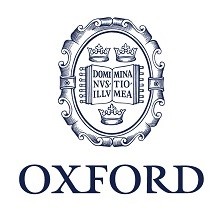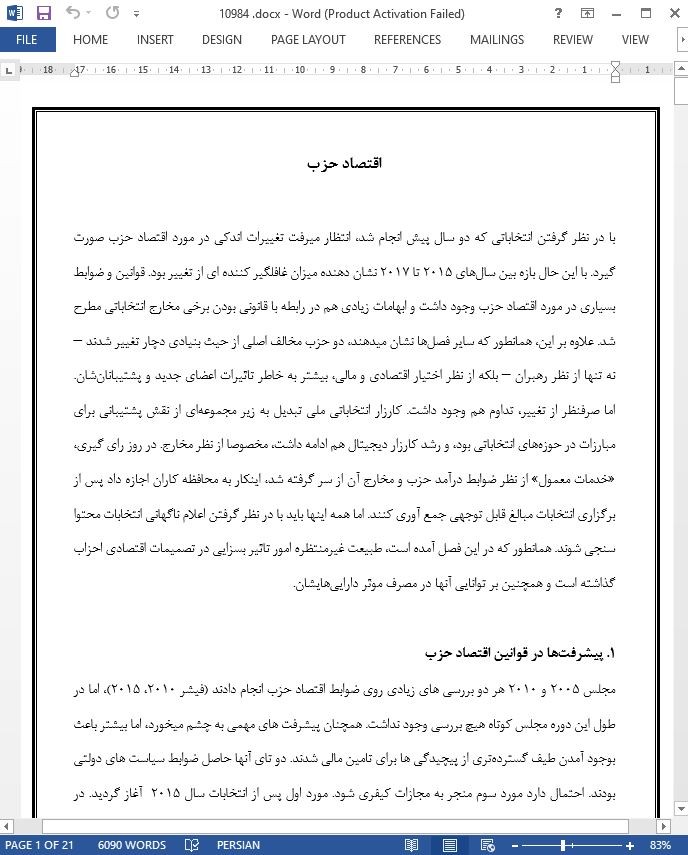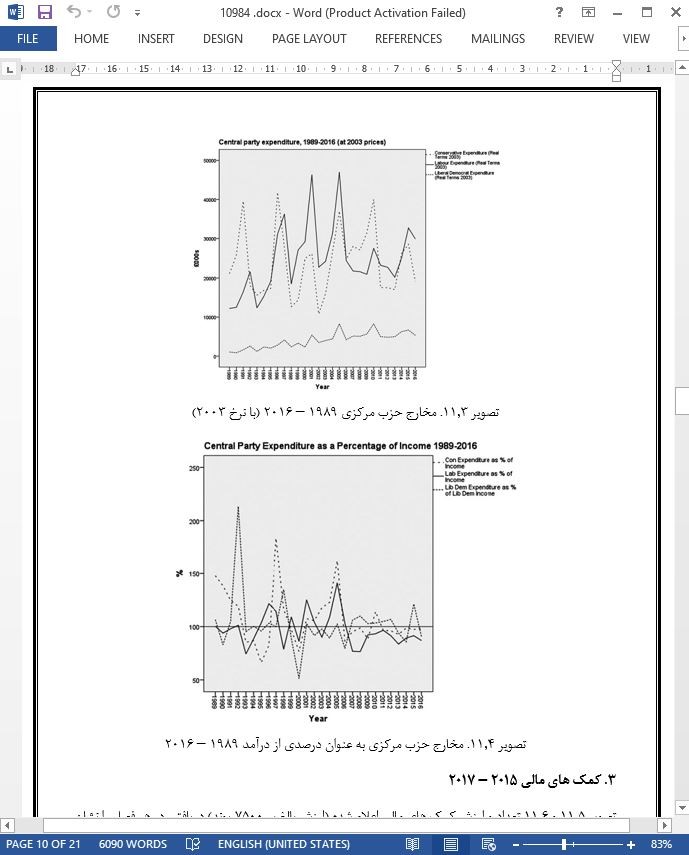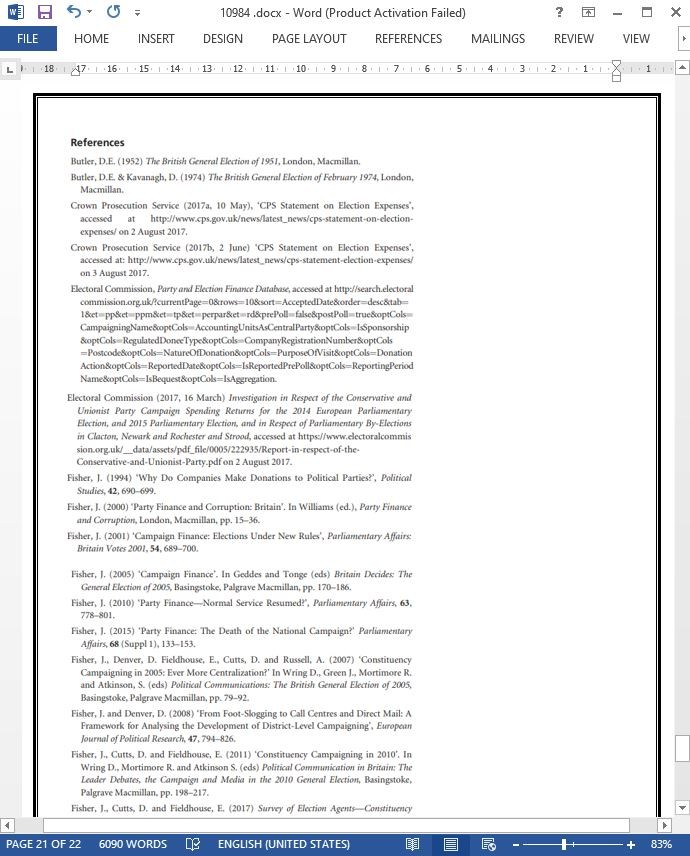
اقتصاد حزب
با در نظر گرفتن انتخاباتی که دو سال پیش انجام شد، انتظار میرفت تغییرات اندکی در مورد اقتصاد حزب صورت گیرد. با این حال بازه بین سالهای 2015 تا 2017 نشان دهنده میزان غافلگیر کننده ای از تغییر بود. قوانین و ضوابط بسیاری در مورد اقتصاد حزب وجود داشت و ابهامات زیادی هم در رابطه با قانونی بودن برخی مخارج انتخاباتی مطرح شد. علاوه بر این، همانطور که سایر فصلها نشان میدهند، دو حزب مخالف اصلی از حیث بنیادی دچار تغییر شدند – نه تنها از نظر رهبران – بلکه از نظر اختیار اقتصادی و مالی، بیشتر به خاطر تاثیرات اعضای جدید و پشتیبانانشان. اما صرفنظر از تغییر، تداوم هم وجود داشت. کارزار انتخاباتی ملی تبدیل به زیر مجموعهای از نقش پشتیبانی برای مبارزات در حوزههای انتخاباتی بود، و رشد کارزار دیجیتال هم ادامه داشت، مخصوصا از نظر مخارج. در روز رای گیری، «خدمات معمول» از نظر ضوابط درآمد حزب و مخارج آن از سر گرفته شد، اینکار به محافظه کاران اجازه داد پس از برگزاری انتخابات مبالغ قابل توجهی جمع آوری کنند. اما همه اینها باید با در نظر گرفتن اعلام ناگهانی انتخابات محتوا سنجی شوند. همانطور که در این فصل آمده است، طبیعت غیرمنتظره امور تاثیر بسزایی در تصمیمات اقتصادی احزاب گذاشته است و همچنین بر توانایی آنها در مصرف موثر داراییهایشان.
1. پیشرفتها در قوانین اقتصاد حزب
مجلس 2005 و 2010 هر دو بررسی های زیادی روی ضوابط اقتصاد حزب انجام دادند (فیشر 2010، 2015)، اما در طول این دوره مجلس کوتاه هیچ بررسی وجود نداشت. همچنان پیشرفت های مهمی به چشم میخورد، اما بیشتر باعث بوجود آمدن طیف گستردهتری از پیچیدگی ها برای تامین مالی شدند. دو تای آنها حاصل ضوابط سیاست های دولتی بودند. احتمال دارد مورد سوم منجر به مجازات کیفری شود. مورد اول پس از انتخابات سال 2015 آغاز گردید. در جولای 2015، لایحهای از سوی اتحادیه تجارت ارائه شد که شامل این الزام میشد تا اتحادیه های تجاری از این پس در امور تامین مالی سیاسی رابطه ای «قراردادی» داشته باشند تا اینکه نوعی «برون سپاری» تلقی شوند. این مصوبه تا اعماق روابط حزب کارگر با اتحادیه های تجاری پیش رفت و به نوبه خود و در ادامه قانون اتحادیه تجاری سال 1913 – که باعث ورود اتحادیه های تجاری در سیاست شد، اتحادیه ها را ملزم ساخت برای ورود به عرصه سیاست منابع سیاسی جداگانه ایجاد کنند. این مساله تمام فعالیت سیاسی را پوشش داد – نه فقط مسائل مربوط به حزب کارگر – و در صورتیکه اعضای اتحادیه های تجاری نمیخواستند هزینه اضافی قابل توجهی پرداخت کنند، به صورتی موثر ملزم شدند «برون سپاری» شوند. قانون 1913 زیرساخت قوانین جنبه های مهم تامین مالی کارگر برای 100 سال آینده را تعیین کرد. فعالیت سیاسی از طریق حزب کارگر به صورت جمعی از طریق تصمیم اتحادیه در پیوستن به حزب جلوهگر میشد.
5. نتیجه گیری
اعلام ناگهانی انتخابات در آوریل 2017 پیچیدگی ها مهمی در رابطه با مساله اقتصادی حزبی داشت. در ابتدای سال حزب کارگر در جایگاه بهتری نسبت به حزب محافظه کار قرار داشت – بخش عمده این قضیه مربوط به عدم ثبات در ریاست حزب در مدت بین سال های 2015 و 2016 میشد. اما در انتهای انتخابات محافظه کاران برتری اقتصادی خود را بازیافتند و موفق شدند مبالغ قابل توجهی را در مدت زمانی کم بدست آورند. در بلند مدت این برتری اولیه برای حزب کارگر دشوارتر بدست خواهد آمد، چرا که دیگر انتخابات میان دوره برای تعیین رییس حزب و کسب درآمد اضافی وجود نخواهد داشت. همچنین تاثیر «قرارداد داخلی» برای اعضای اتحادیه های تجاری جدید هم غیرقابل پیش بینی است.
With an election having taken place only two years beforehand, there may have been an expectation that little would change in terms of party finance. Yet the period between the 2015 and the 2017 elections demonstrated a surprising amount of change. There were new laws and policies related to party finance and much uncertainty about the legitimacy of some election spending. Moreover, as other chapters also show, the two main opposition parties were fundamentally changed—not only in terms of leading personnel—but also in respect of financial prowess, largely due to an influx of new members and supporters. But despite change, there was also continuity. The national campaign continued to be subsumed into playing a supporting role for the battles in the constituencies, and the growth of digital campaigning continued, though it was still far from the dominant mode of campaigning, especially in terms of expenditure. And, by polling day, ‘normal service’ was resumed in terms of party income and expenditure, with the Conservatives able to raise significant sums once the election was called. But all of this should also be contextualised by the sudden calling of the election. As this chapter shows, its unexpected nature impacted significantly on parties’ spending decisions and their ability to use their money effectively.
1. Developments in party finance rules
While both the 2005 and 2010 Parliaments saw extensive reviews of party finance regulations (Fisher, 2010, 2015), there was no such review during this short Parliament. There were still important developments, however, which had wider implications for funding more generally. Two of these were a result of government policy. The third may result in criminal prosecution. The first was initiated soon after the 2015 election. In July 2015, a Trade Union Bill was presented, which included a clause requiring trade unions with a political fund to operate a ‘contracting-in’ system rather than a ‘contracting-out’ one. This went to the heart of the Labour Party’s relationship with the trade unions, which—following the Trade Union Act 1913—established that for trade unions to engage in political activity, they must create a separate political fund. This covered all political activity—not just that with the Labour Party—and trade union members were actively required to ‘contract-out’ if they wanted to avoid paying the modest additional fee. The 1913 Act laid the ground rules for an important aspect of Labour funding for much of the next 100 years. Political activity through the Labour Party would be expressed collectively through a union’s decision to affiliate to the party.
5. Conclusion
The sudden calling of the general election in April 2017 had significant implications in terms of party finance. At the start of the year, Labour was in the relatively unusual position of being at a financial advantage relative to the Conservatives—ironically, in part due to the instability surrounding the party’s leadership between 2015 and 2016. But by the time of the election, the Conservatives had re-asserted their financial dominance, raising very significant sums in a short period of time. In the longer term this initial advantage for Labour may be more difficult to achieve, since there will not be the one-off events of leadership elections generating new income, and the effects of ‘contracting-in’ for new trade union members may be unpredictable.
1. پیشرفتها در قوانین اقتصاد حزب
2. گرایشها در درآمد و مخارج حزب
3. کمک های مالی 2015 – 2017
4. مخارج دوره انتخابات
4.1 محافظه کاران
4.2 حزب کارگر
4.3 لیبرال دموکراتها
5. نتیجه گیری
1. Developments in party finance rules
2. Trends in party income and expenditure
3. Donations 2015-2017
4. Election Period Expenditure
4.1 Conservatives
4.2 Labour
4.3 Liberal Democrats
5. Conclusion
- اصل مقاله انگلیسی با فرمت ورد (word) با قابلیت ویرایش
- ترجمه فارسی مقاله با فرمت ورد (word) با قابلیت ویرایش، بدون آرم سایت ای ترجمه
- ترجمه فارسی مقاله با فرمت pdf، بدون آرم سایت ای ترجمه



